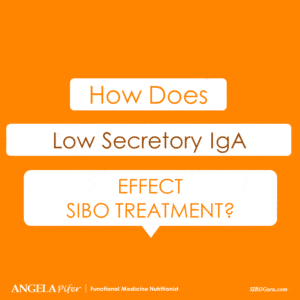When Your Mucosal Defenses are Down: Secretory IgA and Treating SIBO
by Angela Pifer, Functional Medicine Nutritionist SIBOGuru.com
Are you prone to sinus infections, get sick often, allergies… or a functional gut condition or disease? If so, knowing if you have low Secretory IgA, an antibody that plays a crucial role in your mucosal immunity, will help you target your treatment, and, if recovered, can improve your long term prognosis.
Mucosal membranes cover approximately 30 feet of your body and carry 15,000-36,000 species of flora. The number of prokaryotic cells that your body harbors outnumbers the human cells in your body.
In a healthy gut, matter simply moves too fast through the small intestine for the flora to build up to larger numbers. The endogenous flora that is present is literally hanging onto the small intestinal lining for survival.
Though it is beneficial to have a small amount of flora lining the tract, an overgrowth of bacteria or other organisms in this area will interfere with nutrient assimilation and absorption and it will cause bloating, pain and distention.
"When mucosal defenses are down, treating SIBO, great post on SIBO Guru"
↑ Tweet ThisYour body defends against over-colonization of the small intestine by various host ‘defense mechanisms.’ It maintains a proper pH in the gut lumen. Forward moving digestion (keeps things moving from the top down) helps to prevent adhesion and colonization of ingested micro-organisms. Proteolytic digestive enzymes and bile help to digest ingested micro-organisms. The mucosal lining of the gut protects the cells that line your tract and the mucosal immune system plays a role in maintaining homeostasis in the gut.
Secretory IgA is an antibody that plays a critical role in mucosal immunity. If you again consider that mucosal membranes cover approximately 30 feet of your body and the constant environmental exposures of bacteria, pathogens, yeast… etc., that these mucosal cells come into contact with, it makes sense that Secretory IgA is the most abundantly produced antibody in your body. These secretions are found in tears, nasal mucus, saliva, vaginal secretions and bronchial mucus. Secretory IgA serves as your front line defense to protect your gut lining from infections, pathogens and toxins. It helps prevent the absorption of these allergens into the blood stream.
IgA secretions coat your endogenous flora and it helps them create biofilms, so they can group together and this improves their survival rate. They also attach to exogenous (from the outside) flora and can signal this to be cleared from your system without activating the immune system as a whole; without triggering inflammation (which is the usual immune system pathway trigger). Because of this, it is considered part of the innate immune system.
Low Secretory IgA (S IgA) is typically found in people suffering from chronic digestive conditions – inflammatory bowel diseases, Celiac, SIBO and IBS. A low S IgA means that you are immunocompromised at the mucosal level and that you will have a harder time defending yourself against pathogenic invaders. Your mucosal immune system cannot help keep the balance of endogenous flora and it can’t help tag invasive flora or pathogens for removal and this will make you more susceptible to infection, illness and allergies. Low Secretory IgA makes it more difficult to address candida and increases the likelihood of allergies and leaky gut.
How Does Low Secretory IgA Effect SIBO Treatment?
What does this mean with regards to SIBO? A low S IgA is a risk factor for getting SIBO. It is also makes SIBO more difficult to cure long term. Stress has a big influence on S IgA levels, and the stress of dealing with SIBO (or any other chronic digestive condition) can affect S IgA levels even more, by driving them lower.
How do you Test Secretory IgA
Secretory IgA can be tested through serum, saliva and a stool test. I am most interested in the stool test results.
If Secretory IgA levels are high, this indicates a chronic acute infection
If low, Secretory IgA levels can be recovered over time. Clinically I have seen this take 4-6 months and up to a year.
1. Test for pathogens/ parasites. I prefer a three day stool collection that includes both culture and microscopic evaluation of the stool to check for yeast and parasites. Parasites do not drop with each bowel movement so a one day stool collection may miss these. Yeast is very difficult to culture – it does not survive the trip into our bowel movement alive, so it cannot easily be cultured. Clinically, I often see ‘negative’ yeast culture, but ‘many’ yeast microscopically identified on each stool collection. This is ‘positive’ for yeast!
2. Stress reduction must be part of the protocol. I recommend walking, meditation, biofeedback and yoga.
3. Address food sensitivities (I never use a test for this; they are wildly inaccurate –we work through observation to remove known food sensitivities).
4. Support digestion, adrenals and detox pathways
5. Supplement support – target therapy with probiotic, beta glucans, digestive enzymes, bile, HCl, colostrum, choline, essential fatty acids, phosphatidylcholine, and amino complex may help.
6. Address low glutathione levels. Glutathione is the most abundant antioxidant produced in your body. You produce as much glutathione as you do cholesterol and blood sugar. GGT is a blood test that can help us determine glutathione levels. If high, this enzyme uses up glutathione, and we can then deduce that glutathione levels are low.
Enjoying this content? Sign up for updates... It's FREE!



















Comments
from 12 people
PurePaleo Protein by Designs for Health is a great one for SIBO. If you can handle whey protein, then straight whey protein (with nothing else added) is good. Egg white protein is another. I have heard mixed reviews with collagen protein (from my SIBO patients). I have had plenty of patients do well with Nutribiotic Rice Protein and PurePea Protein from Designs from Health.
Warmly
Angela
Angela Pifer
Which protein powder do you recommend for SIBO?which is generally the best? I see several in your shop.....
Marytp
Hi Ashley,
I use these three products by Apex: https://siboguru.com/shop/glutathione-recycler/ and https://siboguru.com/shop/oxicell-se/ and https://siboguru.com/shop/ac-glutathione/ with my patients.
Warmly
Angela
Angela Pifer
How do you suggest raising low glutathione levels?
Ashley
Hi Kat,
I really like Doctor's Data stool test plus parasitology the best. However, this does not diagnose SIBO nor leaky gut. http://www.cyrexlabs.com/CyrexTestsArrays the Array 2 is the best leaky gut test. SIBO is assessed with a lactulose breath test. I recommend https://www.aerodiagnostics.com/ for this test.
After herbals, we wait 5 days and test. After antibiotics we wait 2 weeks and test. The stool test insert will offer instructions, but the general suggestion is that you are off antibiotics and herbal antibiotics at least 2 weeks. I do not recommend running a stool test that close to treatment. I do recommend retesting SIBO with the breath test, to make sure that is it truly gone, prior to stepping into gut healing, immune modulation... etc. I don't run the stool test again until at least 3 months post treatment.
Warmly
Angela
Angela Pifer
Hi Angela,
I was wondering, which Lab do you recommend for stool testing to address sibo and leaky gut more accurately?
I've done the organic acids urine testing by Genova which showed multiple vitamin deficiencies and bacterial overgrowth, but I have yet to do a stool test and the breath test when I am done with the first round of ADP (6 weeks).
Speaking of which, do you recommend how many days between the last dose of herbal treatment and probiotics before a stool test and a breath test? I've heard it can interfere with the results if the person doesn't wait long enough.
Many thanks! :)
Kat
Hi Kay,
This is showing you that your mucosal immune response is at high alert and the underlying issue needs to be determined (inflammation, pathogen, parasite, chronic dysbiosis, SIBO, etc). Address this, heal the gut and then retest to see if this has recovered.
Warmly,
Angela
Angela Pifer
What about those with *high* secretory Iga? Thanks!!
Kay
Angela HI.
I have candida and am thinking of beginning a protocol
with diatomaceous earth and bentonite clay.
I cannot find an answer to this question on the web .
If d.e. disrupts yeast biofilms then does it also disrupt biofilms
protecting my (flagging) healthy gut bacteria colony.
I don't need to make matters worse in my gut.
also leaky-sibo-and c-diff c.
thank you for the insight I have garnered from your detailed answers to
posted questions.
L gordon
I don't know who you wrote this for but you helped a breothr out.
Piotr